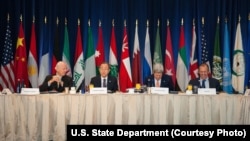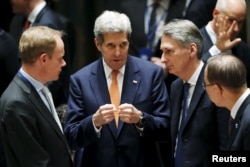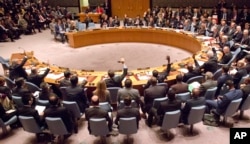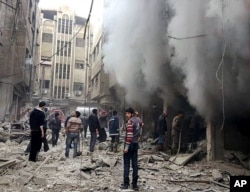The U.N. Security Council's unanimous approval of an international road map for a Syrian peace process was a rare display of unity among major powers on a conflict that has claimed more than a quarter-million lives, U.S. Secretary of State John Kerry said.
Kerry praised "the unprecedented degree of unity" in the council, which previously has been stymied in finding a political solution in Syria. He called Friday's agreement "a milestone" and predicted the diplomatic effort would move forward quickly in the new year.
Turkey said the U.N. resolution was a positive step toward resolving the lengthy and costly civil war. Russia, however, said it was ready to step up its involvement in Syria if necessary.
The resolution expresses support for a Syrian-led political process facilitated by the United Nations. It formalizes a target of six months for establishing a transitional government, followed by elections within 18 months.
It also calls for the implementation of a nationwide cease-fire in parallel with intra-Syrian peace talks.
But absent from the U.N. resolution, and the peace plan drafted by the United States, Russia and 18 other countries working together on the Syrian crisis, is any mention the future of Syrian President Bashar al-Assad.
Western countries have called for his departure, but Russia and China say he should not be required to leave power as a precondition for peace talks.
On Friday, Kerry expressed optimism that the plan would move along swiftly.
"In January we hope and expect to be at the table and to be able to implement a full cease-fire," he said. "And that means all the barrel bombs will stop, all the bombing, all the shooting, all the attacks on either side."
Kerry said Assad had "lost the ability to unite the country," but he also said that demanding Assad's immediate departure was "prolonging the war."
The resulting agreement "gives the Syrian people a real choice, not between Assad and Daesh, but between war and peace," Kerry said, using the Arabic acronym for the Islamic State extremists.
Syrian opposition groups
Syrian opposition groups voiced their displeasure with the plan Saturday. The country's fractured opposition has insisted Assad must go to achieve peace.
Khaled Khoja, head of the Istanbul-based National Coalition, the main Syrian opposition group, called the resolution unrealistic, saying it "undermines the outcome of the meetings of revolutionary forces in Riyadh and waters down previous U.N. resolutions concerning a political solution in Syria."
Khoja made the comments to the French news agency AFP.
Fellow coalition member Samir Nashar said bombing by the regime and Russia must stop for there to be a sustainable cease-fire.
Step toward peace
Turkish Prime Minister Ahmet Davutoglu, speaking Saturday in Istanbul, called the U.N. resolution a positive step toward resolving the lengthy and costly civil war through diplomacy.
However, Davutoglu said it didn't provide protection for the Syrian people from the "cruelty of Syrian President Bashar al-Assad."
Davutoglu said Turkey would continue its efforts to find a political transition in Syria in line with the Geneva Communique on Syria of 2012.
That first international effort to draft a potential settlement of the Syrian political crisis envisioned a transitional governing body would be formed by mutual consent of all parties involved in the conflict.
Meanwhile, Russian President Vladimir Putin said his country had not used all of its military capability in Syria and might use more military means there if necessary.
"We see how effectively our pilots and intelligence agents coordinate their efforts with various kinds of forces — the army, navy and aviation, how they use the most modern weapons," Putin said. "I want to stress that these are by far not all of our capabilities. We have more military means, and we will use them if need be."
Russia has been conducting an air campaign in Syria since September, targeting Syrian rebel groups fighting the Assad regime as well as Islamic State fighters.
Russian motives
Western governments and military analysts have accused Russia of placing a much higher priority on preserving the government of Assad, a longtime Russian ally, than on the U.S. objective of targeting extremists.
More than 250,000 people have died since the Assad government’s crackdown on political protests turned into a full-blown civil war in 2011.
More than half of Syria's entire prewar population has been uprooted by the war — families that either have fled abroad as refugees or have been displaced internally, driven from their homes by violence.
Hundreds of thousands of Syrians have made the dangerous and often deadly journey across the Mediterranean into Europe this year.
Some material for this report came from AFP.


















